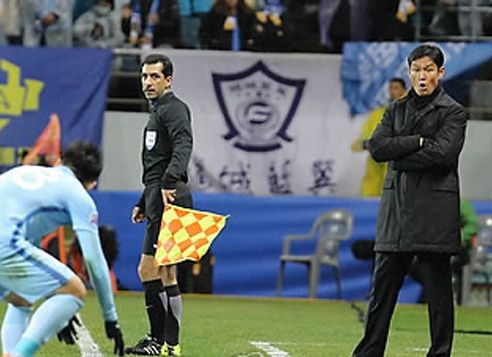South Korean football coaches and players in China are in the hot seat as they've been struggling to make a positive impact with their respective clubs early into the season.
After six matches, South Korean coaches Park Tae-ha and Choi Yong-soo are under fire as their clubs remain in the relegation zone of the Chinese Super League. Park's Yanbian Funde and Choi's Jiangsu Suning are the two worst teams in the 16-team league with winless records. Both teams have two draws and four losses.
 |
In this file photo taken on Feb. 22, 2017, Jiangsu FC's South Korean coach Choi Yong-soo (right) give directions to his players during the AFC Champions League Group H match at Jeju World Cup Stadium in Seogwipo, Jeju Island. (Yonhap) |
Choi left South Korean outfit FC Seoul to sign with Jiangsu in the middle of the 2016 season. He led the club to a runners-up finish in both the league and the Chinese Football Association Cup in his first season, but following injuries to foreign players Roger Martinez and Alex Teixeira, the 43-year-old coach is struggling to produce good results with Jiangsu this season.
Even though Jiangsu had already qualified for the Asian Football Confederation Champions League knockout stage with four straight wins, Chinese media have been reporting that Choi's exit is imminent. They have been mentioning names like former England and Russia national team boss Fabio Capello as a possible replacement, while others have reported that Inter Milan manager Stefano Pioli could take over Choi's job. Both Inter and Jiangsu are owned by China's Suning Group.
According to Chinese news outlet Titan Zhoubao, the management of Jiangsu had a meeting on Sunday to discuss Choi's dismissal, but has yet to confirm its decision. It reported that Choi is likely to remain on the bench on Tuesday when Jiangsu host South Korean club Jeju United in the AFC Champions League Group H match.
Park helped Yanbian earn promotion to the first division in 2015 and led the team to the ninth-place finish the following year.
Yanbian have been known for their counter attack strategy, but are struggling to score goals this season. So far, they've scored only two goals in six matches, tied for the worst with No. 13 Henan Jianye.
Changchun Yatai head coach Lee Jang-soo is already out of his job. The veteran tactician, who had coached five different Chinese clubs, signed with Changchun last May and helepd the club avoid relegation. But after Changchun failed to earn victories in the first five matches of 2017, the club management earlier this month announced they will give Lee "a temporary rest" from the bench and brought in the club's technical advisor Chen Jingang to fill his position.
Under Chen's management, Changchun earned their first victory of the season on Sunday by beating Henan 1-0.
Among four South Korean coaches in the Chinese league, only Chang Woe-ryong seems to be in safe waters. His Chongqing Dangdai Lifan are currently No. 7 with two wins, three draws and one loss.
South Korean players in the CSL are suffering from reduced playing time following the league's rule change on foreign players.
Previously, teams were allowed to play three foreigners plus one Asian player. But now the Asian quota is gone, and that one spot in the lineup must be filled by a Chinse player under the age of 23.
Among 10 South Korean footballers in the CSL, only Jiangsu's Hong Jeong-ho has played all six matches so far. But even Hong's status isn't safe as his head coach Choi's fate is in limbo, while Jiangsu's poor defensive record is putting pressure on him. Jiangsu have allowed 12 goals in six matches, tied for the worst in the league with Changchun.
Another South Korean center back Jang Hyun-soo is with the league's No. 1 club Guangzhou R&F, but he is the only player on the squad who has yet to play this season.
Jang, who has made 63 appearances with Guangzhou R&F over the last three seasons, recently said he will try to move to a new club in this summer.
"South Korean players and coaches are losing their presence in China recently," said Yanbian head coach Park. "South Korean players get big salaries, so it's not easy for them to return home.
It's also difficult for them to play for other Chinese clubs because of the new rule." (Yonhap)







![[Today’s K-pop] Blackpink’s Jennie, Lisa invited to Coachella as solo acts](http://res.heraldm.com/phpwas/restmb_idxmake.php?idx=644&simg=/content/image/2024/11/21/20241121050099_0.jpg)
